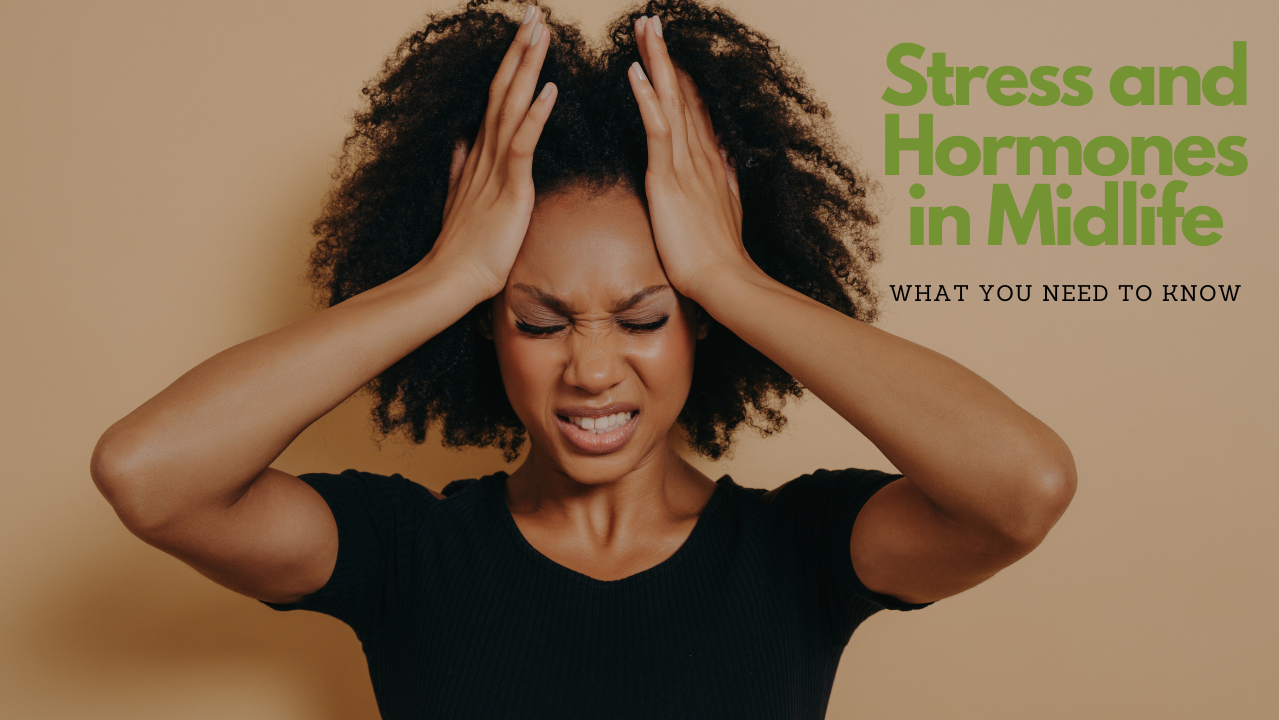Stress and Hormones in Midlife and What You Need to Know
Oct 09, 2025
Ever feel like the smallest thing can send you spiraling lately? You’re not imagining it and you’re definitely not alone.
That short fuse, that tired-but-wired feeling, or that 3 a.m. wake-up call where your mind won’t stop racing?
That’s stress meeting midlife hormones… and the two can become a bit of a tangled mess.
Let’s unpack what’s really going on and how to get your calm (and your balance) back.
The Midlife Hormone Storm
As you move through perimenopause and menopause, your body begins a natural shift in hormones — especially estrogen, progesterone, and cortisol.
Here’s the science in simple terms:
-
Estrogen, your “feel-good” hormone, helps regulate mood, energy, and even how your body handles stress. When estrogen drops, your brain becomes more sensitive to stress hormones.
-
Progesterone acts like your body’s natural calming agent — it promotes relaxation and better sleep. As levels decline, you may feel more anxious or restless.
-
Cortisol, your main stress hormone, can become chronically elevated if your body is constantly in “fight or flight” mode leading to fatigue, belly fat, brain fog, and hormone imbalances.
So if you’ve noticed that what used to roll off your back now feels overwhelming, that’s biology, not weakness.
How Stress Impacts Hormones (and Everything Else)
When your brain senses stress, it signals your adrenal glands to release cortisol and adrenaline, two hormones designed to keep you alert and alive.
In short bursts, that’s a good thing. But in midlife, many women are dealing with chronic stress, juggling work, aging parents, kids, and shifting bodies. The result? Your adrenal glands never get the “off” signal.
Here’s what that looks like:
-
Weight gain (especially around the belly)
-
Sleep problems, cortisol keeps you alert at night
-
Fatigue and burnout, your adrenals get worn out
-
Anxiety or low mood,fluctuating hormones amplify emotional responses
-
Cravings,especially for sugar or carbs (your body’s quick energy fix)
Long-term stress also interferes with thyroid function, insulin sensitivity, and menopausal hormone balance, creating a cascade effect that makes midlife feel even harder.
Science-Backed Ways to Rebalance Stress and Hormones
Good news: You can absolutely reset this system.
The key is learning how to work with your hormones, not against them.
Here’s what research shows helps most:
1. Regulate cortisol with movement
Gentle, consistent movement lowers cortisol levels better than intense exercise.
Try yoga, walking, Pilates, or strength training all proven to balance stress hormones and improve insulin sensitivity.
2. Fuel your body, don’t deprive it
Skipping meals or cutting carbs spikes cortisol and worsens hormonal imbalance.
Focus on protein-rich meals, slow carbs (like quinoa, lentils, or oats), and healthy fats to keep your blood sugar and stress hormones steady.
3. Prioritize quality sleep
Cortisol and melatonin work on opposite cycles. If you’re not sleeping well, cortisol stays high.
Aim for 7–8 hours, limit screens before bed, and try magnesium or chamomile tea to calm the nervous system.
4. Breathe and restore
Deep breathing, meditation, or even 10 minutes of quiet can physically lower cortisol levels.
Science shows that slow, diaphragmatic breathing activates your parasympathetic nervous system — the body’s natural “relax and repair” mode.
5. Find joy and connection
Social connection increases oxytocin (the “bonding” hormone), which directly lowers cortisol.
Laugh, hug, dance, pray, these simple acts are hormone therapy in disguise.
The Stress-Hormone Loop
Think of your stress and hormone systems as best friends,they talk to each other constantly.
When one is off, the other struggles too.
Lower stress, balanced cortisol, steadier estrogen and progesterone, calmer moods, better sleep, and easier weight management.
It’s a loop you can absolutely influence not through perfection, but through small, consistent habits that support your body’s natural rhythm.
Stay connected with news and updates.
Join our mailing list to receive the latest news and updates from our team.
Don't worry, your information will not be shared.
We hate SPAM. We will never sell your information, for any reason.



